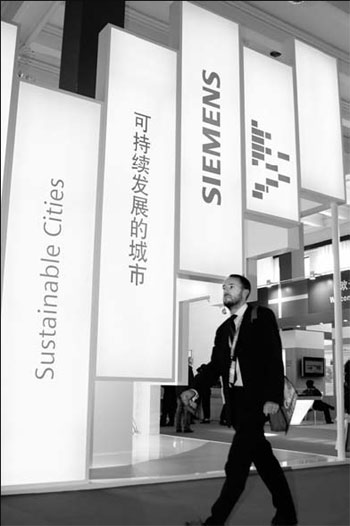Siemens set to launch new business sector
|
A Siemens AG booth at an exhibition in Beijing. The company will launch its fourth business arm in October in tandem with city-focused centers of competence for urban infrastructure. Provided to China Daily |
SHANGHAI - Siemens AG confirmed on Friday that a fourth business arm will be launched on Oct 1, offering better urban infrastructure solutions for cities.
"Siemens is taking action to help the world tackle the challenges that fast urbanization will bring and generate a new growth engine for Siemens," said Roland Busch, a member of the management board and CEO of the company's newly established Infrastructure & Cities Sector.
The new sector will combine with city-focused centers of competence for urban infrastructure solutions that will work closely with planners to improve traffic operations, building technologies and energy distribution.
"We talked to mayors before setting up the sector and discovered that there is a common pattern in what cities really need, including a desire to ensure security, create job opportunities and make cities more livable," said Busch.
He added that those conditions are related to efficient supplies of water and power, traffic management and mobility and will be implemented in conjunction with a CO2 emissions target to ensure that cities use energy and resources efficiently.
Because China has so many cities of different sizes, each with its own pace of economic development, Siemens also has a diverse portfolio to solve problems.
"We've tried to approach the different economic development and potential reconstruction conditions with a diversity of strategy solutions to save as much energy as possible," said Busch.
According to a report published by The Financial Times in March, the new sector will have revenue of 16.5 billion euros ($23.2 billion) and will employ 81,000 people.
The revamp will reduce the industry arm's revenue by almost 50 percent to 19 billion euros.
In addition, the Asia-Pacific region, especially the Chinese market, has been earmarked as an essential and important focus for Siemens.
Since 2007, the company has worked in Shanghai to operate the Yangpu district office building under a performance contract as a means of reducing energy consumption.
"Siemens has analyzed the building and invested in the reconstruction of air-conditioning, lighting and other facilities to reduce energy use by 16 percent and save 500,000 yuan ($78,000)," said Busch.
The company has also worked with other major cities such as Beijing, Guangzhou, Qingdao and Wuhan on a series of urban development projects during the past couple of years.
Looking ahead, Siemens aims to set up a combination of smart buildings and traffic systems to ensure energy efficiency in cities.
"If we have more electric cars running on the streets of China in the future, we will be able to ensure that these smart buildings supply and consume energy by maintaining efficient storage capacity and meeting the power demands of cars and buildings effectively," said Busch.



















